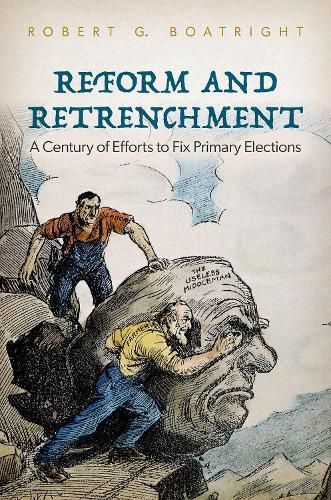Readings Newsletter
Become a Readings Member to make your shopping experience even easier.
Sign in or sign up for free!
You’re not far away from qualifying for FREE standard shipping within Australia
You’ve qualified for FREE standard shipping within Australia
The cart is loading…






The direct primary, in which voters rather than party leaders or convention delegates select party nominees for state and federal offices, was one of the most widely adopted political reforms of the early twentieth century. Yet after decades of practice and study, scholars have found little clear evidence that direct primaries changed the outcomes of party nominations. The conventional wisdom has always been that once the Progressive movement declined and voters became distracted by more pressing issues, parties slowly reasserted their control over candidate selection. This book shows that the conventional wisdom is wrong. Exploring changes in American primary election laws from the 1920s to the 1970s, Robert G. Boatright argues in Reform and Retrenchment that the introduction of the direct primary created far more chaos in American elections than most scholars realize. As he shows, political parties, factions, and reform groups manipulated primary election laws in order to gain an advantage over their opponents, often under the guise of enhancing democracy. Today there is widespread dissatisfaction with primaries, and we are again in a period of experimentation. Boatright looks at how this history can help us understand the reform ideas before us today, ultimately suggesting that, for all of its flaws, there is likely little that can be done to improve primaries, and those who would seek to change American politics are best off exploring reforms to other areas of elections and governance.
$9.00 standard shipping within Australia
FREE standard shipping within Australia for orders over $100.00
Express & International shipping calculated at checkout
The direct primary, in which voters rather than party leaders or convention delegates select party nominees for state and federal offices, was one of the most widely adopted political reforms of the early twentieth century. Yet after decades of practice and study, scholars have found little clear evidence that direct primaries changed the outcomes of party nominations. The conventional wisdom has always been that once the Progressive movement declined and voters became distracted by more pressing issues, parties slowly reasserted their control over candidate selection. This book shows that the conventional wisdom is wrong. Exploring changes in American primary election laws from the 1920s to the 1970s, Robert G. Boatright argues in Reform and Retrenchment that the introduction of the direct primary created far more chaos in American elections than most scholars realize. As he shows, political parties, factions, and reform groups manipulated primary election laws in order to gain an advantage over their opponents, often under the guise of enhancing democracy. Today there is widespread dissatisfaction with primaries, and we are again in a period of experimentation. Boatright looks at how this history can help us understand the reform ideas before us today, ultimately suggesting that, for all of its flaws, there is likely little that can be done to improve primaries, and those who would seek to change American politics are best off exploring reforms to other areas of elections and governance.